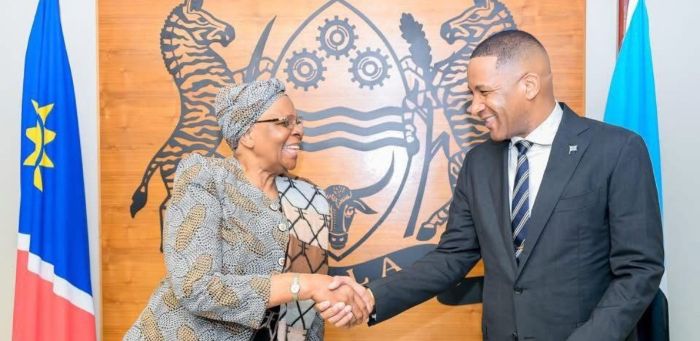(3 Minutes Read)
Namibia and Botswana are advancing plans to jointly develop an oil refinery, marking a pivotal shift in Southern Africa’s energy strategy. This bilateral initiative, currently under governmental negotiation, underscores a growing regional commitment to energy security, reduced dependency on fuel imports, and broader economic diversification.
During a recent diplomatic meeting in Gaborone, Namibian President Netumbo Nandi-Ndaitwah and Botswana’s President Duma Boko emphasised the importance of collaborative infrastructure to drive regional integration and tackle economic disparities. A joint statement highlighted the urgent need for practical projects that generate employment and promote inclusive growth.
This move comes as both nations, long dependent on diamond exports through Debswana and Debmarine, grapple with declining global demand, driven by changing consumer trends and synthetic alternatives. Debswana cut production by 6 million carats in 2024, while Debmarine Namibia projects an additional 5% reduction in 2025 after a 13% drop in 2024.
Amid these shifts, energy is emerging as a focal point for diversification. The refinery project is part of a broader push to localise value chains, stabilise national revenues, and reduce exposure to volatile commodity cycles.
Namibia’s refined petroleum imports totalled USD 1.52 billion in 2023, sourced largely from distant suppliers like India, the UAE, and Saudi Arabia. Botswana’s $1.08 billion in fuel imports came mostly from South Africa and Namibia, revealing a heavy reliance on regional but still limited supply networks.
A jointly owned refinery would reduce these vulnerabilities, serve wider Southern African markets, and act as a stabilising force for both economies. Shared ownership ensures balanced benefits while promoting interdependence that supports regional cohesion.
The initiative aligns with growing hydrocarbon exploration across the region. Namibia has attracted global interest for offshore reserves, with firms like TotalEnergies and Shell leading exploratory efforts. Similarly, Mozambique and South Africa are ramping up drilling to boost energy autonomy.
Read Also;
https://trendsnafrica.com/oil-discoveries-jack-up-namibias-asset-demand/
Ultimately, the proposed refinery is more than an infrastructure asset—it signals a maturing policy shift toward resilience and integration. As planning advances, issues such as environmental impacts, funding, location, and logistics will shape the project’s viability. If successful, it could set a new benchmark for energy cooperation across Africa.





